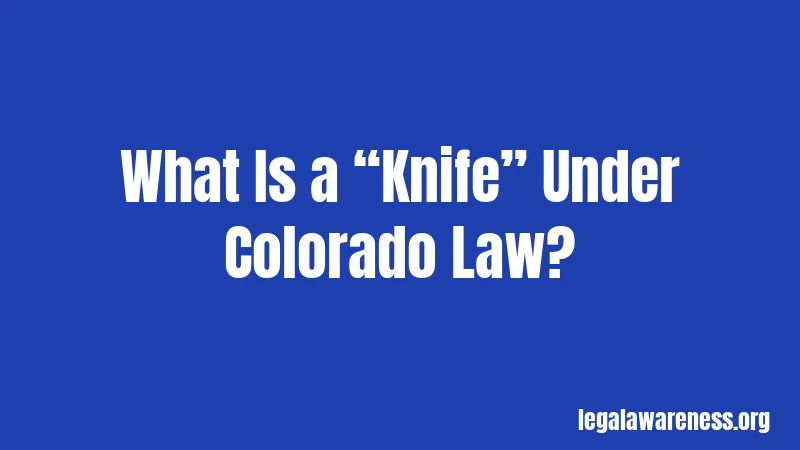Colorado Knife Laws in 2026: Everything You Actually Need to Know
Most people have no idea Colorado’s knife laws are this specific. Seriously. You could think you’re carrying legally, then find yourself in real trouble. Colorado takes blade length, concealed carry, and location seriously. Let’s break down exactly what you need to know to stay on the right side of the law.
The thing is, Colorado’s rules have actually relaxed in some ways since 2017. Switchblades and gravity knives? Now legal. But there’s still a lot of confusion out there. Stay with me here—this one’s important.
What Is a “Knife” Under Colorado Law?

Here’s where it gets specific. Colorado law doesn’t say every sharp object is a “knife.” It has a very particular definition. A knife, according to the law, is any blade over 3.5 inches long. This includes dirks, daggers, stilettos, and similar weapons.
But here’s the kicker: hunting and fishing knives are handled differently. They’re basically exempt from the definition. So if you’re carrying a hunting or fishing knife, the blade length doesn’t matter—even if it’s massive. You just have to use it for hunting or fishing, and you need to prove that if charged.
Think of it like a traffic ticket, but with stricter rules. Short blade? Fewer problems. Long blade? You’ve got restrictions.
The Basic Rule: The 3.5-Inch Threshold
Okay, this is the foundation of everything. If your blade is 3.5 inches or shorter, you can basically carry it however you want. Concealed, openly, in your pocket, clipped to your belt. It doesn’t matter much.
But step over 3.5 inches? Everything changes. You can’t carry that knife hidden. Period. Not in your jacket, not in your glove box, not under your car seat.
What counts as “concealed”? If someone can’t see it without really looking, it’s concealed. A knife clipped to your pocket with the clip visible? Courts say that’s open carry. A knife in your pants pocket hidden by a shirt? That’s concealed, and it’s illegal if it’s longer than 3.5 inches.
Sound complicated? It’s actually not—the rule is pretty straightforward.
Open Carry: What You Can Actually Do

Here’s the good news. Colorado is pretty gun-friendly, and that attitude extends to knives. You can openly carry most knives without a permit. Even big ones. Even scary-looking ones.
Want to carry a nine-inch fixed-blade knife on your hip? Legal, as long as it’s visible. A hunting knife with a six-inch blade? Open it up, and you’re fine. The only real exceptions are places we’ll talk about in a second.
Wondering if this applies to you? If you’re willing to have the knife visible, Colorado generally says yes.
The only knife you absolutely cannot carry openly is a ballistic knife. We’ll get to those in a minute, but trust me—you don’t want one.
Concealed Carry: The Strict Rules
Now, here’s where things get serious.
Concealing a knife with a blade longer than 3.5 inches without a specific reason? That’s illegal. It’s not a permit situation like with firearms. It’s just not allowed. You could face charges.
But there are exceptions. And honestly, this is where most people trip up.
At your home or property: You can carry any knife concealed on your own property. Your house, your garage, your yard—it’s yours.
At your place of business: Same deal. If you own or work at a business, you can carry concealed knives there.
In your private vehicle: You can conceal a knife in your car for lawful protection. But here’s the thing—it has to be in your personal vehicle. And it’s probably best to keep it accessible just in case you need it, not hidden in places that look suspicious.
For hunting or fishing: This is important. If you’re actively hunting or fishing, blade length doesn’t matter. You can carry any knife, concealed or open.
These exceptions are actually broader than you might think. But use them narrowly. If you’re not actively hunting or fishing, don’t claim the exception.
Switchblades and Gravity Knives: The Story Changed in 2017

Back the day, switchblades were totally illegal in Colorado. But in 2017, that changed. Senate Bill 17-008 basically said, “Yeah, you can have switchblades now.”
So switchblades and gravity knives are legal in Colorado. But—and this is important—they still follow the 3.5-inch concealed carry rule. You can carry them openly, no problem. But concealed? Only if the blade is 3.5 inches or shorter.
Oh, and here’s where it gets tricky. Some cities didn’t get the memo. Or they just ignored it.
Denver, for example, still bans switchblades. Boulder has restrictions too. So if you’re in Denver with a switchblade, the state says it’s legal, but the city says it’s not. Which one wins? That’s a great question, and honestly, you don’t want to be the test case.
If you’re planning to carry a switchblade, check your city’s rules first.
Ballistic Knives: Never, Ever
Let’s be really clear about this one: ballistic knives are illegal. No exceptions. Ever.
A ballistic knife is designed so the blade shoots out of the handle. Spring-loaded, explosive charge—doesn’t matter. If the blade can be forcefully ejected from the handle, it’s a ballistic knife, and it’s a Class 5 felony to possess it.
Class 5 felony means up to 3 years in prison and/or fines from $1,000 to $100,000. For just having one.
Don’t do this. Not for collecting. Not for self-defense. Not for any reason.
School Property: The Zero-Tolerance Zone
Here’s where the law doesn’t mess around.
It is absolutely illegal to carry any knife—any knife—on school property. This includes public schools, private schools, colleges, universities, and seminaries. The rule covers kindergarten all the way through graduate school.
And this is a Class 6 felony. Penalties include up to 18 months in prison and fines up to $100,000.
Are there exceptions? Barely. You can have a knife in your car while at a college, university, or seminary—but only if it stays locked in the vehicle. You can’t bring it inside. And this exception only applies to higher education, not to K-12 schools.
The message is super simple: don’t bring a knife to school. Period.
Local Laws: This Part’s Confusing
Hold on, this part is important.
Colorado doesn’t have statewide knife preemption. That means cities and counties can make their own rules. And they do.
Denver restricts the open carry of switchblades and gravity knives. Aurora has restrictions on blade length for open carry. Boulder has its own ordinances. Even smaller cities might have different rules.
The problem? You can follow Colorado state law and still break a city ordinance. That’s not fair, but that’s the reality.
Before you carry a knife somewhere, check the local rules. Seriously. Don’t assume state law applies everywhere.
When You Can Use a Knife for Self-Defense
Colorado’s “Make My Day” law protects people using reasonable force to defend themselves in their own home. That includes using a knife.
But step outside your home? Things get legally complicated fast. You need to be able to prove the threat was immediate and serious. Using a knife could be seen as excessive force, depending on the situation.
The takeaway: carry a knife for self-defense, and understand that you’ll probably face questions about whether your response was reasonable.
Penalties: What Actually Happens if You Mess Up
Concealing a knife with a blade longer than 3.5 inches (without a valid exception) is typically a Class 1 misdemeanor. That’s up to 364 days in jail and/or up to $1,000 in fines.
Possessing a ballistic knife? Class 5 felony. Up to 3 years prison and up to $100,000 in fines. On a second offense, it becomes a Class 4 felony with 2 to 6 years prison and up to $500,000 in fines.
Carrying a knife on school property? Class 6 felony. Up to 18 months prison and up to $100,000 in fines.
These aren’t small punishments. And a felony conviction stays with you.
Kids and Knives: What About Minors?
There’s no specific age restriction for owning a knife in Colorado. But minors need to be careful.
Small utility knives and pocket knives are generally okay for kids doing legitimate activities like Scouts or camping. But anything bigger or used as a weapon? That’s unlawful, especially on school grounds.
If you’re a parent, teach your kids that school is a no-knife zone. Full stop.
Traveling Through Colorado with Knives
If you’re driving through Colorado with a knife, the basic rules apply. You can openly carry most knives. You can conceal carry as long as the blade is 3.5 inches or shorter. And remember—check local ordinances in the cities you’re passing through.
If you’re traveling in a private vehicle for lawful protection (hunting, fishing, self-defense at home), you get a pass even with longer knives. But again, check local laws. Denver isn’t going to let you carry a switchblade just because you’re passing through, no matter what state law says.
Frequently Asked Questions
Can I carry a knife in my car in Colorado?
Yes. If the blade is 3.5 inches or shorter, there are no restrictions. If it’s longer, keep it visible or have a lawful reason (hunting, fishing, protection at home).
Are butterfly knives legal in Colorado?
This is a gray area. They might be considered gravity knives and therefore legal. But there’s no definitive court case saying so. You’re probably better off not carrying one, especially in Denver.
What if I’m just traveling through Denver with a legal Colorado knife?
State law might preempt Denver’s local ordinance, but courts haven’t decided this yet. You don’t want to be the test case. Be cautious.
Can I carry a knife for self-defense in Colorado?
Yes, technically. But be aware that using a knife for self-defense can get complicated legally. You need to prove the threat was serious and your response was reasonable.
Do I need a permit to carry a concealed knife in Colorado?
No. Colorado doesn’t issue permits for concealed knife carry. You either meet the legal exceptions or you don’t.
Special Note: Check Before You Carry
This is probably the most important thing: local laws matter. Denver is stricter than rural Colorado. Boulder has its own rules. Even small towns might have ordinances you’re not aware of.
Before you carry a knife anywhere—especially in a city—look up the local rules. It takes five minutes online, and it could save you serious legal trouble.
Final Thoughts
Colorado’s knife laws are actually pretty permissive compared to many states. You can carry most knives openly, and you have options for concealed carry as long as you follow the rules.
The basic rule is simple: know your blade length, understand where you can carry, and check local ordinances. Ballistic knives are always illegal. School property is always off-limits. Everything else has nuance.
When in doubt, ask a lawyer or check with local law enforcement. It’s way better to ask a question than to find out later that you broke the law.
Now you know the basics. Stay informed, stay safe, and when in doubt, look it up or ask a lawyer.
References
Colorado Revised Statutes § 18-12-101 to 18-12-108 – Knife Definitions and Regulations
American Knife and Tool Institute – Colorado Knife Laws
Colorado Legal Defense Group – Knife Laws Explained
